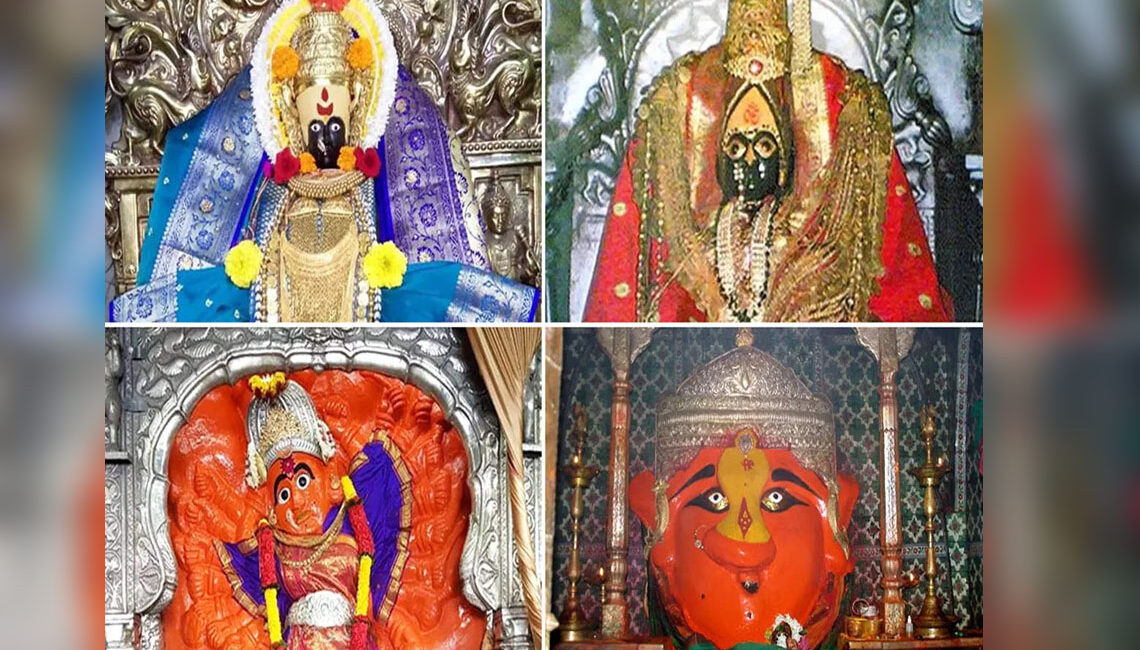Sade Teen Shakti Peethas Maharashtra
Sade Teen Shakti Peethas Maharashtra
Sade Teen Shakti Peethas Maharashtra, a land steeped in spirituality, is home to the revered Sade Teen Shakti Peethas (3.5 Shakti Peethas), sacred shrines dedicated to Goddess Shakti. These shrines—Kolhapur, Tuljapur, Mahur, and Nashik—hold immense religious significance and are among the 108 Shakti Peethas mentioned in Hindu scriptures. Each temple boasts unique legends, architectural marvels, and vibrant Navratri celebrations, drawing millions of devotees annually. Let’s delve into their divine stories and spiritual allure.
1. Mahalakshmi Temple, Kolhapur: The Seat of Universal Motherhood
Legend & History
The Ambabai Temple in Kolhapur, dedicated to Goddess Mahalakshmi, is one of Maharashtra’s oldest Shakti Peethas. Believed to have been built between the 7th–8th century CE by the Chalukya dynasty, this temple symbolizes the fusion of Vaishnavism and Shaivism. Legends say the idol was hidden for centuries during Islamic invasions and revived under Chhatrapati Sambhaji’s reign (1715–1722).
Divine Significance
- The 40-kg stone idol wears a crown adorned with Sheshnag (divine serpent) and is flanked by a lion and Shiva Linga.
- Devotees revere her as the Kulswamini (family deity) of Maharashtra.
Navratri Highlights
The temple dazzles with rituals like Rathotsav (chariot procession) and nightly aartis.
2. Tulja Bhavani Temple, Tuljapur: The Warrior Goddess of Shivaji Maharaj
Primary Keyword: Tulja Bhavani Temple
Legend & History
Tuljapur’s Tulja Bhavani Temple, the “Adya Shakti Peeth,” is linked to Chhatrapati Shivaji Maharaj. It’s believed the goddess gifted him the Bhavani Talwar (sword) to establish Swarajya. Built in Hemadpanthi style, the temple sits atop the Balaghat mountain range.
Divine Significance
- The self-manifested (swayambhu) idol symbolizes victory over evil.
- Unique 21-day Navratri celebrations feature grand processions and cultural events.
Architectural Marvel
The temple’s spire remains invisible until devotees ascend the final steps, symbolizing humility before the divine.
3. Renuka Devi Temple, Mahur: The Mother of Parashurama
Primary Keyword: Renuka Devi Mahur
Legend & History
Mahur’s Renuka Devi Temple honors Goddess Renuka, mother of Lord Parashurama. According to lore, after her self-immolation (sati), her face emerged from the earth here. The 13th-century Yadava-era temple shares the hill with shrines of Lord Dattatreya and Parashurama.
Divine Significance
- Renuka Devi is worshipped as Tandulmukhi (face resembling a grain) due to her partial emergence.
- The site is believed to be Lord Dattatreya’s birthplace.
Pilgrimage Appeal
The temple complex, surrounded by lush hills, offers serene spirituality and historical intrigue.
4. Saptashrungi Devi, Nashik: The 18-Armed Guardian of Sahyadris
Primary Keyword: Saptashrungi Devi Nashik
Legend & History
Perched on the 4,800-ft Saptashrungi Gad, this “half Peetha” enshrines Goddess Saptashrungi, an incarnation of Durga. Legends say she emerged from a honeycomb discovered by a shepherd. The cave-carved idol, with 18 arms, symbolizes the combined power of Mahakali, Mahalakshmi, and Mahasaraswati.
Divine Significance
- Associated with Ramayana: Lord Ram, Sita, and Lakshman visited during exile.
- The Girija Maharnadi stream here is linked to Brahma’s kamandalu (water pot).
Trekking & Spirituality
The rugged Sahyadri terrain adds adventure to devotion, attracting trekkers and pilgrims alike.
Why “Sade Teen” (3.5) Peethas?
The term Sade Teen refers to the unique count:
- Kolhapur (Full Peetha)
- Tuljapur (Full Peetha)
- Mahur (Full Peetha)
- Nashik (Half Peetha)
Navratri Celebrations: A Spiritual Extravaganza
While Navratri spans nine days statewide, Tuljapur celebrates for 21 days with grandeur. Each temple hosts special rituals, cultural performances, and night-long bhajans, making this period ideal for pilgrimage.
Plan Your Pilgrimage
Maharashtra’s Sade Teen Shakti Peethas blend devotion, history, and natural beauty. Whether seeking blessings during Navratri or exploring ancient legends, these shrines promise a transformative spiritual journey.
Pro Tip: Combine your pilgrimage with visits to nearby attractions like Panchaleshwar Temple (Nashik) or the historic Sindhudurg Fort (Kolhapur).
Panchaleshwar Temple: A serene 12th-century marvel nestled along the Godavari River.
Sindhudurg Fort: A 17th-century sea fortress built by Chatrapatti Shivaji Maharaj, offering history and breathtaking Arabian Sea views.


Leave a Comment